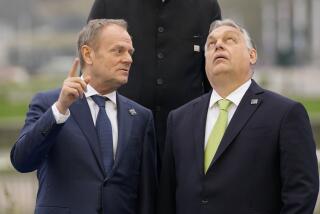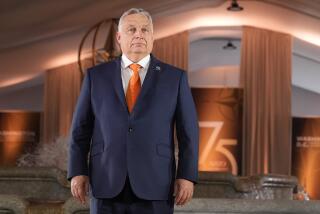Support System
- Share via
President Bush leaves Hungary and Poland today and flies to Paris for the economic summit, in his suitcase a piece of the “iron curtain”--a section of barbed wire from the fence that separated Hungary and Austria until this spring. “It’s a marvelous symbol of this whole visit,” Bush said in thanking the Hungarian prime minister. Indeed, the barbed wire is exactly what many Americans will remember about Bush’s Eastern European tour, with its message that the harsh division between East and West is melting. But what will the Poles and Hungarians remember?
The President carried similiar economic packages to both countries: private sector incentives and debt rescheduling. He also gave them similiar messages on the political liberalization in both countries: Keep up the good work. But Poland and Hungary are very different countries and they received his message differently.
The Poles have known Americans for a long time. Presidents Nixon, Ford and Carter all made the trip and President Bush himself is no stranger, having visited in 1987 as vice president. This familiarity encourages Poles to expect a lot from Americans--more than Americans can afford. The moderate economic offerings were bound to be a disappointment, and sure enough, they were. But the President was careful to reiterate American support for the crucial process of economic reform.
Politically, Poles will remember how even-handed Bush was, lunching with a shirt-sleeved Gen. Wojciech Jaruzelski, the Communist leader, one day and Solidarity’s Lech Walesa the next. Although the three never appeared together in public, Bush was able to bestow greater legitimacy on the two leaders individually, consequently adding legitimacy to their mutual efforts. The ease of his manner with both of them may also ease the tension between them.
Unlike the Poles, the Hungarians had never entertained an American President. No matter what he did or said, President Bush was bound to be a novelty. Dripping rain on the airport Tarmac, he tore up his prepared speech and handed his raincoat to an elderly spectator, an act of impetuousity and kindness that was sure to please the crowd. Hungarian leaders said they were surprised by the $25 million in aid that Bush offered. “We did not expect money from the United States,” said Imre Pozsgay, the Hungarian minister of state. Bush’s visit could not help but bring greater legitimacy to a country long considered something of a maverick within the Warsaw Pact. The President could do little wrong in Hungary, and didn’t.
But what he didn’t do in either country--and what he is absolutely incapable of doing--is tell them how to go about de-communizing their nations and economies. That they must discover for themselves.
More to Read
Get the L.A. Times Politics newsletter
Deeply reported insights into legislation, politics and policy from Sacramento, Washington and beyond. In your inbox twice per week.
You may occasionally receive promotional content from the Los Angeles Times.










